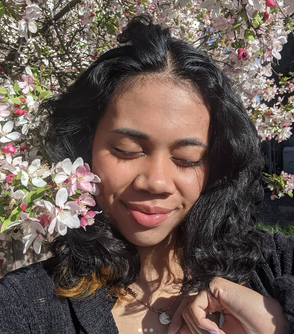
I grew up in Marin County mostly around white people. At my schools: Hamilton Elementary, San Jose Middle, and Novato High, I definitely had other people of color around me. I feel that there was an unspoken sense of community or likeness among us, even if they weren’t my closest friends or if we didn’t spend time together at lunch everyday. I was always very aware of my teachers, though. In my Marin public schooling experience, I have never had a Filipino or Asian teacher, I’ve never really had a teacher that was not white. That really reflected the content I learned about Asian American history which was always a short paragraph and a marginal note or two —ever extensive and always limited and vague.
In my Marin public schooling experience I have never had a Filipino—or Asian--teacher... that really reflected the content I learned about—Asian American history which was always a short paragraph and a marginal note or two.
In college my experience has been very different. I attend University of San Francisco, a school that prides itself on social justice advocacy/work and legacies. The school has ways to go in terms of diversity (socio-economic and ethnic backgrounds) and general access to various services for students. It is one of a handful of US schools that offers a minor in Philippine Studies. I had a variety of professors: Asian, Black, Latino, and so on. In courses such as Filipina Literature, Asian American History, Filipino (a language course), People of Mixed Descent, Filipino American Arts, and Anti-Racism and Allyship, I was able to learn and understand much more about Filipino American history and culture as opposed to what I was taught in public school. Having engaged with Asian American history was very inspiring and my Filipino American heritage has become less mysterious and will not be forgotten.
Now that we have been in a state of unrest amidst social justice movements concerning Black lives and Asian lives, I feel much more moved to engage with and learn about the roots of Filipino Americans. This climate has caused nervous excitement and unrest and has been emotionally, mentally, and physically taxing to many people. As a young Filipina and Black American, I feel a responsibility to inform myself and others about the past that has brought us to where we stand in the present. I would love to see that reflected in public schools, especially in Marin County where anti-racism work is much talked about but much less acted on or administered. While it is understandable to promote national identity through education, space should also be made for the distinct ethnic groups and identities that have been directly involved in the nation’s history.
A reflection on the writings of José Rizal: “Know history, know self. No history, no self.” (my interpretation of his quote: “Ang hindi lumingon sa pinanggalingan ay hindi makakarating sa paroroonan”).
In my Marin public schooling experience I have never had a Filipino—or Asian--teacher... that really reflected the content I learned about—Asian American history which was always a short paragraph and a marginal note or two.
In college my experience has been very different. I attend University of San Francisco, a school that prides itself on social justice advocacy/work and legacies. The school has ways to go in terms of diversity (socio-economic and ethnic backgrounds) and general access to various services for students. It is one of a handful of US schools that offers a minor in Philippine Studies. I had a variety of professors: Asian, Black, Latino, and so on. In courses such as Filipina Literature, Asian American History, Filipino (a language course), People of Mixed Descent, Filipino American Arts, and Anti-Racism and Allyship, I was able to learn and understand much more about Filipino American history and culture as opposed to what I was taught in public school. Having engaged with Asian American history was very inspiring and my Filipino American heritage has become less mysterious and will not be forgotten.
Now that we have been in a state of unrest amidst social justice movements concerning Black lives and Asian lives, I feel much more moved to engage with and learn about the roots of Filipino Americans. This climate has caused nervous excitement and unrest and has been emotionally, mentally, and physically taxing to many people. As a young Filipina and Black American, I feel a responsibility to inform myself and others about the past that has brought us to where we stand in the present. I would love to see that reflected in public schools, especially in Marin County where anti-racism work is much talked about but much less acted on or administered. While it is understandable to promote national identity through education, space should also be made for the distinct ethnic groups and identities that have been directly involved in the nation’s history.
A reflection on the writings of José Rizal: “Know history, know self. No history, no self.” (my interpretation of his quote: “Ang hindi lumingon sa pinanggalingan ay hindi makakarating sa paroroonan”).
